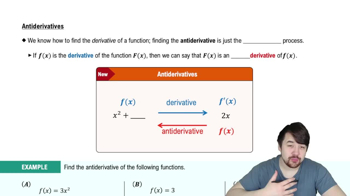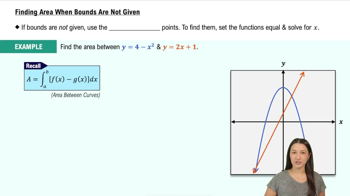Matching functions with area functions Match the functions ƒ, whose graphs are given in a― d, with the area functions A (𝓍) = ∫₀ˣ ƒ(t) dt, whose graphs are given in A–D.
Table of contents
- 0. Functions7h 55m
- Introduction to Functions18m
- Piecewise Functions10m
- Properties of Functions9m
- Common Functions1h 8m
- Transformations5m
- Combining Functions27m
- Exponent rules32m
- Exponential Functions28m
- Logarithmic Functions24m
- Properties of Logarithms36m
- Exponential & Logarithmic Equations35m
- Introduction to Trigonometric Functions38m
- Graphs of Trigonometric Functions44m
- Trigonometric Identities47m
- Inverse Trigonometric Functions48m
- 1. Limits and Continuity2h 2m
- 2. Intro to Derivatives1h 33m
- 3. Techniques of Differentiation3h 18m
- 4. Applications of Derivatives2h 38m
- 5. Graphical Applications of Derivatives6h 2m
- 6. Derivatives of Inverse, Exponential, & Logarithmic Functions2h 37m
- 7. Antiderivatives & Indefinite Integrals1h 26m
- 8. Definite Integrals4h 44m
- 9. Graphical Applications of Integrals2h 27m
- 10. Physics Applications of Integrals 3h 16m
- 11. Integrals of Inverse, Exponential, & Logarithmic Functions2h 31m
- 12. Techniques of Integration7h 41m
- 13. Intro to Differential Equations2h 55m
- 14. Sequences & Series5h 36m
- 15. Power Series2h 19m
- 16. Parametric Equations & Polar Coordinates7h 58m
8. Definite Integrals
Fundamental Theorem of Calculus
Problem 5.3.2
Textbook Question
Suppose F is an antiderivative of ƒ and A is an area function of ƒ. What is the relationship between F and A?
 Verified step by step guidance
Verified step by step guidance1
Understand the definitions: An antiderivative F of a function ƒ is a function such that the derivative of F is equal to ƒ, i.e., . An area function A of ƒ represents the accumulated area under the curve of ƒ from a fixed point to a variable point x.
Recall the Fundamental Theorem of Calculus: It states that if A(x) is the area function of ƒ, then A'(x) = ƒ(x). This means the derivative of the area function is the original function ƒ.
Recognize the connection: Since F is an antiderivative of ƒ, and A'(x) = ƒ(x), it follows that A(x) and F(x) differ by a constant. Specifically, , where C is a constant.
Interpret the constant C: The constant C depends on the choice of the lower limit of integration in the area function A(x). If the lower limit is changed, the value of C will adjust accordingly.
Summarize the relationship: The area function A(x) is essentially an antiderivative of ƒ, but it includes a constant term that depends on the lower limit of integration. Both F and A are closely related through this constant adjustment.
 Verified video answer for a similar problem:
Verified video answer for a similar problem:This video solution was recommended by our tutors as helpful for the problem above
Video duration:
2mPlay a video:
Key Concepts
Here are the essential concepts you must grasp in order to answer the question correctly.
Antiderivative
An antiderivative of a function f is another function F such that the derivative of F is equal to f, i.e., F' = f. This means that F represents a family of functions whose slopes at any point correspond to the values of f. Antiderivatives are essential in calculus for solving problems related to integration and finding areas under curves.
Recommended video:

Antiderivatives
Area Function
An area function A associated with a function f typically represents the accumulated area under the curve of f from a specific point to a variable endpoint. Mathematically, it is defined as A(x) = ∫[a to x] f(t) dt, where a is a constant. The area function is crucial for understanding how the total area changes as the endpoint varies, linking it to the concept of integration.
Recommended video:

Finding Area When Bounds Are Not Given
Fundamental Theorem of Calculus
The Fundamental Theorem of Calculus connects differentiation and integration, stating that if F is an antiderivative of f on an interval [a, b], then the integral of f from a to b can be computed as F(b) - F(a). This theorem establishes that the area function A is directly related to the antiderivative F, as A(x) = F(x) - F(a), illustrating the deep relationship between these concepts.
Recommended video:

Fundamental Theorem of Calculus Part 1

 6:11m
6:11mWatch next
Master Fundamental Theorem of Calculus Part 1 with a bite sized video explanation from Patrick
Start learningRelated Videos
Related Practice
Textbook Question
32
views
